- Region
- Águilas
- Alhama de Murcia
- Jumilla
- Lorca
- Los Alcázares
- Mazarrón
- San Javier
-
ALL AREAS & TOWNS
- AREAS
- SOUTH WEST
- MAR MENOR
- MURCIA CITY & CENTRAL
- NORTH & NORTH WEST
- TOWNS
- Abanilla
- Abarán
- Aguilas
- Alamillo
- Alcantarilla
- Aledo
- Alhama de Murcia
- Archena
- Balsicas
- Blanca
- Bolnuevo
- Bullas
- Cañadas del Romero
- Cabo de Palos
- Calasparra
- Camping Bolnuevo
- Campo De Ricote
- Camposol
- Canada De La Lena
- Caravaca de la Cruz
- Cartagena
- Cehegin
- Ceuti
- Cieza
- Condado de Alhama
- Corvera
- Costa Cálida
- Cuevas De Almanzora
- Cuevas de Reyllo
- El Carmoli
- El Mojon
- El Molino (Puerto Lumbreras)
- El Pareton / Cantareros
- El Raso
- El Valle Golf Resort
- Fortuna
- Fuente Alamo
- Hacienda del Alamo Golf Resort
- Hacienda Riquelme Golf Resort
- Isla Plana
- Islas Menores & Mar de Cristal
- Jumilla
- La Azohia
- La Charca
- La Manga Club
- La Manga del Mar Menor
- La Pinilla
- La Puebla
- La Torre
- La Torre Golf Resort
- La Unión
- Las Palas
- Las Ramblas
- Las Ramblas Golf
- Las Torres de Cotillas
- Leiva
- Librilla
- Lo Pagan
- Lo Santiago
- Lorca
- Lorquí
- Los Alcázares
- Los Balcones
- Los Belones
- Los Canovas
- Los Nietos
- Los Perez (Tallante)
- Los Urrutias
- Los Ventorrillos
- Mar De Cristal
- Mar Menor
- Mar Menor Golf Resort
- Mazarrón
- Mazarrón Country Club
- Molina de Segura
- Moratalla
- Mula
- Murcia City
- Murcia Property
- Pareton
- Peraleja Golf Resort
- Perin
- Pilar de la Horadada
- Pinar de Campoverde
- Pinoso
- Playa Honda
- Playa Honda / Playa Paraíso
- Pliego
- Portmán
- Pozo Estrecho
- Puerto de Mazarrón
- Puerto Lumbreras
- Puntas De Calnegre
- Region of Murcia
- Ricote
- Roda Golf Resort
- Roldan
- Roldan and Lo Ferro
- San Javier
- San Pedro del Pinatar
- Santiago de la Ribera
- Sierra Espuña
- Sucina
- Tallante
- Terrazas de la Torre Golf Resort
- Torre Pacheco
- Totana
- What's On Weekly Bulletin
- Yecla


- EDITIONS:
 Spanish News Today
Spanish News Today
 Alicante Today
Alicante Today
 Andalucia Today
Andalucia Today
Murcia Today Weekly Bulletin 24th July
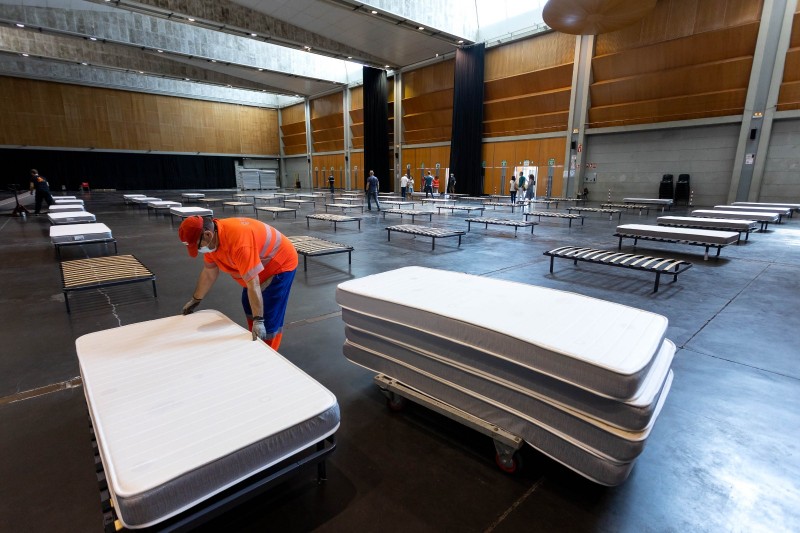
This week the Covid situation has started to once again cause concern in Spain as the number of outbreaks increases considerably all over the country, including here in Murcia.
There's no hiding from the possibility that far from the second wave being something which could be ahead of us in the autumn, that in fact the tip of this wave is actually just starting to break on the horizon right in front of us and may hit the beach a little sooner than anticipated.
This is NOT scaremongering, but is the reason why this bulletin is reaching you on a Saturday morning and not on a Friday evening, as the volume of information flooding in on Friday was simply too much, and processing, researching this amount of new material to reflect the rapidly changing situation and writing a bulletin at the same time was simply physically impossible.
We start with the bulletin itself; the last week of July is always the first of two weeks taken off during the summer, the other being the last week of August, so next week there will NOT be a bulletin. Should there be any significant news items, then an article will be written and sent by email, but this will only occur should something very major take place.Some news will be posted on www.murciatoday.com.
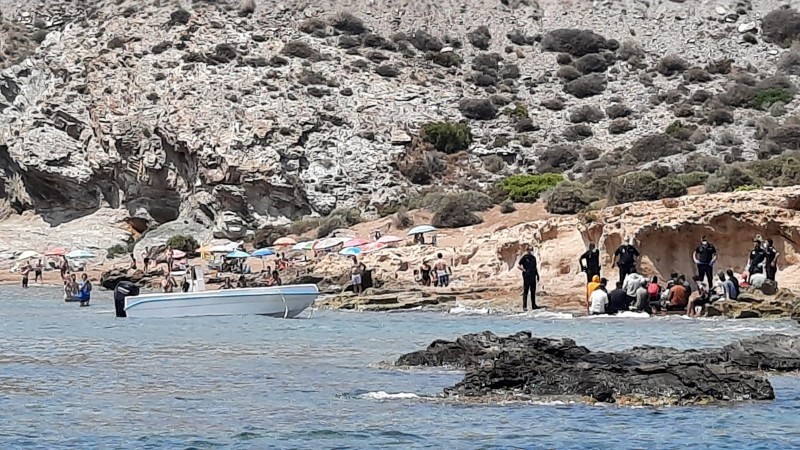
Irregular immigration
Rather than starting with Covid this week, we'll start with an extraordinary Friday.
Dozens (and now possibly hundreds) of irregular migrants reach the Murcian and Almerian coast in small boats
The problem of irregular migrants arriving on the Spanish coastline in small boats has continued this week, with reports of pateras containing Covid-positive migrants reaching the coasts as far apart as the Canary Islands and Murcia.
On Monday 116 migrants were rescued from small boats off the Andalucian coast in the Mar de Alborán; on Thursday evening, 56 people were rescued off the coastline of Almería in the waters of Cabo de Gata, the Canary Islands reported that 100 of its current 165 active cases of Covid related to migrants who had arrived on the islands in small pateras, and this morning there appears to have been a large-scale co-ordinated launch of small boats targeting the Almería and Murcian coastlines as well as other areas of Spain.
Early this morning 13 people reached Tenerife in the Canary Islands, and 25 were rescued in Cabo de Gata in Almería. Several boats were detected on the Murcian coastline and migrants found on the coast itself. Throughout the day boats continued to arrive on both coastlines and in both the Canary and Balearic Islands. The Guardia Civíl in Almería described the events of today as an "avalanche of boats", with 80 people reaching the coast in small boats, plus a further 102 rescued out at sea in Almería. Yet more are believed to have made it to land and disappeared without being detected and detained. The first boat was detected at 07:00 in Carboneras and the last at 18:10 in the evening.The Guardia report semi-rigid boats coming into the coast at high speed, dropping off their occupants and disappearing back out to sea.
Along the coast in Murcia a similar situation was unfolding
The first boat was near to Portmán to the south-east of Monte de las Cenizas and contained 12 men and one woman.
The second boat was intercepted in Cabo de Palos, and also contained 16 Algerian males.
Other boats arrived in the Cabo Tiñoso area early in the morning around 08:00 and their occupants had disembarked before police arrived at the scene. 22 men and one woman were detained in the area around La Azohía and Campillo de Adentro, although it is not clear if all those who had reached the coast were detained; it is quite common for the so-called “patera-taxi” drivers to deposit migrants on the shore and then head back out to sea without being detected and it is often the case that those that do reach the shore in boats which are subsequently abandoned, split-up to minimise the chance of being detained by police, which is exactly what was happening in neighbouring Almería.
At 08:10 a boat containing 12 males was detected to the south-east of Cabo de Palos.
At 09:10 another boat containing 10 males was intercepted to the south of Cabo Negrete containing 10 males, believed to be Algerians.
As the day wore on other boats continued to arrive.The video footage below was sent by a reader and shows other migrants arriving on the beach in the full sight of bathers and swimmers enjoying the summer sun on Playa Amarilla in Águilas opposite the Isla del Fraile island. (see below)
The coastguard and marine services were overwhelmed trying to detect the boats and pick up the occupants and the lack of information about what was going on was severely criticised by Cartagena council who called for the resignation of the Government Delegate as the boats continued to arrive and there was nowhere to put the occupants as they were brought into Cartagena.
No official information was given to the media, and in spite of chasing hard for information, the latest figure is believed to be 186 just in Murcia, although there may yet be more and some are known to have escaped without being detained.
The migrants which were detained were transferred to the Escombreras Industrial area where a temporary reception centre has been set up manned by the Cruz Roja, and all the new arrivals are given a medical check-over before being tested for Covid.
Once they are on land, they come under the jurisdiction of the Policía Nacional who are working in collaboration with the Cruz Roja to ensure that any migrants testing positive for Covid-19 are quarantined.
At the moment, those in quarantine are being housed in the albergue in the regional park of El Valle close to Murcia City, but there is no doubt that these facilities will be inadequate and cannot cope with this volume of migrants, particularly not in the light of the current Covid situation.
The situation regarding the arrival of these irregular migrants which tend to be from Algeria in Murcia due to the distance from the Algerian coast, is currently up in the air due to the continued closure of the migrant transit centres (CIE) which normally process these irregular arrivals and attempt to deport them from Spain back to their country of origin.(video footage of the Águilas arrivals shows darker skinned males which tend to be of sub-saharan origin rather than Algerians and normally cross from Morocco, not Algeria)
The principal reason behind this has been the closure of the Moroccan and Algerian borders due to the Covid crisis.
The first stage of the border re-opening began on 14th July, but aims to permit Moroccan residents to return home to their country from abroad rather than to open borders for tourism; while the borders have been closed it has been impossible for Spain to repatriate migrants with expulsion orders.
The police have no jurisdiction to hold any migrants testing negative for Covid-19 beyond a 72 hour period as technically they have not committed a crime and once it is confirmed that they are not covid positive and are not required to quarantine, the police have no choice other than to release them.
On the 7th/8th July a similar wave of boats reached the Murcian Region sparking off a major disagreement between the Murcian Regional Government and the Government Delegate to the Region who represents the national Government of Spain which has the responsibility for migrant expulsions and which would normally take charge of the new arrivals, but due to the lack of the CIE centre had nowhere in which they could be safely housed.
There were several escapes of Covid-positive migrants from hospitals in which positive patients were being treated, including one case in which a migrant climbed out of the hospital window from the fourth floor using his bedsheets as a rope and in another instance a group of migrants broke out of the temporary marquee in which they were waiting for the results of Covid-tests and disappeared off into Cartagena; only six of the 9 were detained.
This latest batch of arrivals is likely to spark off a similar discussion with the regional government concerned about the safety of residents and holidaymakers.
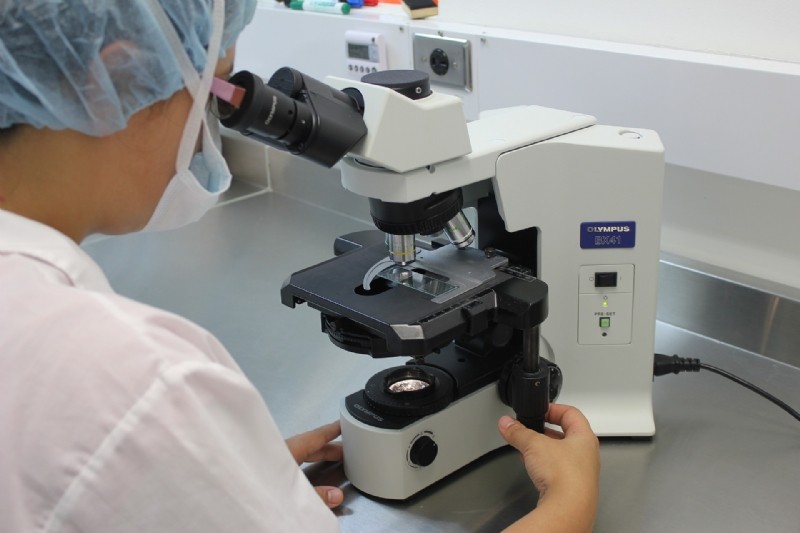
Covid this week:
Covid Spain
This week the number of positive Covid cases detected by PCR in Spain has increased by 12,166.
Andalusia 14,328 (+70; 597 in the last 7 days)
Aragon 9,772 (+298; 2113 in the last 7 days)
Asturias 2,454 (+2; 12 in the last 7 days)
Balearic Islands 2,343 (+11; 40 in the last 7 days)
Canary Islands 2,578 (+8; 95 in the last 7 days)
Cantabria 2,419 (+9; 38 in the last 7 days)
Castilla-La Mancha 18,539 (+18; 124 in the last 7 days)
Castilla y León 20,017 (+17; 132 in the last 7 days)
Catalonia 72,919 (133; 4846 in the last 7 days)
Ceuta 164
Valencian Community 12,442 (40; 472 in the last 7 days)
Extremadura 3,302 ( 5; 59 in the last 7 days)
Galicia 9,584 (20; 87 in the last 7 days)
Madrid 73,944 ( 107; 789 in the last 7 days)
Melilla 129
Murcia 1,988 (38; 197 in the last 7 days)
Navarra 6,244 (93; 518 in the last 7 days)
Basque Country, 15,086 (49; 813 in the last 7 days)
La Rioja 4,169 (+4 ; 58 in the last 7 days).
Saturday: Valencia region makes use of mask mandatory in public at all times; only the Canary Islands and Madrid remain outside of the same rules nationwide.Click for info
Let the fining begin!: The regional governments of the Canary Islands, Asturias, Cataluña, and provincial governments of Sevilla and Granada in Andalucía are the first to embark on a fineathon. Their principal target is non-compliance relating to the use of masks.
Sunday: Barcelona forced to close beaches as thousands ignore request to stay at home
The restrictions were widely ignored as 415,000 headed for the beach and coast despite being requested not to.
On Sunday morning the Catalan Government, the Generalitat, took the decision to apply further restrictive measures to contain Covid outbreaks in the municipalities of Figueres and Vilafant, in Girona, and in Sant Feliu de Llobregat, in Barcelona, in addition to the existing retrictions in Barcelona and its metropolitan area and the Lleida comarcas of Segrià and La Noguera. Semi-confinement measures came into force on Saturday in Barcelona and its metropolitan environment, but appear to have been largely ignored by the population, as more than 415,000 cars were recorded as driving out of the Catalan capital, heading towards coastal areas. On Saturday afternoon Barcelona council was obliged to close 5 beaches at 17;30; Nova Icária, Barceloneta, Mar Bella, Bogatell and Sant Sebastiá as occupancy levels were considered to be too high. 944 new cases of Covid were diagnosed in Cataluña in the last 24 hours.
Monday: 685 cases in the last 24 hours.This weekend for the second time, the Ministry of Health did not publish Covid figures in a daily press conference as is normally the case, so when the figures for the weekend were finally published on Monday evening after adjustment, the scale of them was significant; 4,581 new cases since the figures were last published on Friday with 201 outbreaks across Spain.
Tuesday: 529 new Covid cases and 2 deaths
Wednesday: 730 new Covid cases, highest figure since 7th May. 224 active outbreaks, 2 deaths
Navarra decreed the closure of bars, discotheques, gaming halls, clubs and leisure clubs at 2 in the morning, banned botellon drinking sessions and reduced the number of people allowed in a group at any one time in the hospitality sector to 10 after detecting 130 new cases. 21 outbreaks have been reported in Navarra, the worst associated with the Mendillorri neighborhood of Pamplona, where infections reached 122 this Wednesday, 93% of them amongst the younger population and linked to nightlife after the celebration of the 'no sanfermines'. (The San Fermin fiestas were cancelled so local youngsters held parties regardless to celebrate the non-happening of the fiestas). In another area of Navarra phase 2 restrictions were reintroduced.
Thursday: 970 new cases.3 deaths. 281 active outbreaks.
The acting head of the area of the Coordination Center for Health Alerts and Emergencies of the Ministry of Health, María José Sierra, explained that since the end of the de-escalation, 369 outbreaks with 5,000 cases have been detected in Spain, although many of the 281 outbreaks currently recorded are now under control.
In the last two weeks, she said, the accumulated incidence of infections has tripled with more and more outbreaks associated with leisure activities and young people.She stated that the health service is "concerned" about the epidemiological situation, although the health system is not experiencing stress despite the increase in cases, as 50% of positives are asymptomatic or very mild. The bulk of the cases relate to the younger population who are spreading the virus through social gatherings and through family reunions and gatherings, as well as via nocturnal leisure activities. The average age of positive cases diagnosed this Thursday has dropped fom 60 to 45 as a result, although the Health Ministry is starting to see a rise in the age of the latest patients, something which she said: "worries us because age is the factor that is most associated with the severity of the disease. "
However, although the numbers of new cases are rising, the health system is much better placed to control it and handle it as well as being better equipped and with an experienced staff, now used to working with Covid cases, the medical profession is aware of how the virus evolves and has found ways to minimise fatalities, the elderly are much better protected so the fatalities are considerably lower, and the cases which are being diagnosed now are principally milder as the virus is spreading amongst the younger population rather than the more vulnerable older population.
Although the figures are rising, the authorities are less concerned at the moment than they were last time we reached this level of new cases; last time the virus was something new, the cases being diagnosed were all PCR and were patients arriving in hospitals with severe symptoms as at that point the rapid testing kits were not available and testing on mild cases was not being undertaken. It is believed that at the start of the first wave there were more cases than were actually ever diagnosed as many were asymptomatic and mild cases were taken to be the common cold, subsequent testing highlighted this higher incidence, so at the moment the mild cases are being detected due to increased testing and the more vulnerable groups are being better protected, so there are less serious cases.
The government has already made several announcements about the plans being prepared for a second wave in the autumn and the mass purchase and manufacture of protective equipment, as well as logistical preparations, so there is no hiding from the fact that these new outbreaks are a concern, but there is NO talk of a general lockdown and no public talk about wider-scale restrictions.
The autonomous regional governments are making their own decisions at a local level as the number of cases dictates and are imposing their own restrictions as they see fit. The Health Ministry said on Thursday that they were satisfied the right decisions were being made.
Friday: 922 new cases. 193 outbreaks in addition to the general transmission in Catalonia.
The communities of greatest concern are still Catalonia and Aragon, where the majority of coronavirus cases have been reported due to the detected outbreaks.
Aragon now has at least 56 active coronavirus outbreaks, and has detected 298 positives in the last 24 hours. Catalonia is in a similar situation, with several dozen active outbreaks and 133 new infections. To try to stop the further spread of the virus, the Generalitat in Catalonia has ordered the closure of discotheques, dance halls and salas de fiestas where private functions are usually held as well as any locations with dance floors, and any venues which put on entertainment shows throughout Catalonia, and has also ordered that gaming venues, casinos and bingo halls close at midnight.
The Generalitat has also set up a network of "refuge" hotels for tourists who have to preventatively isolate themselves during their stay in Catalonia after having been in contact with someone infected with coronavirus. The measure aims to help the tourism sector, which is being "badly hit" by the effects of the pandemic, and avoids the need for the establishment itself having to take responsibility for managing a positive COVID-19 patient, according to General Director of Tourism, Octavi Bono.
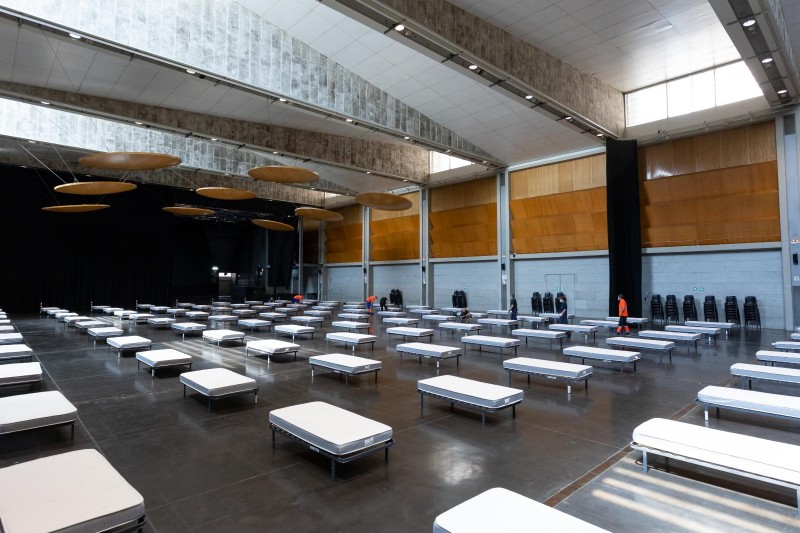
In the Region of Aragón meanwhile, Zaragoza City Council has set up a "multipurpose" space in the capital, "to house asymptomatic patients or those with mild symptoms" of coronavirus in a sports pavilion in collaboration with the Cruz Roja (see images).
Zaragoza has been rigidly enforcing public health restrictions and confinements; this story relates to a much-written about topic this week, the wearing of masks, showing how strict the authorities are becoming about implementing the measures; 101.50 euros for a cup of coffee in Zaragoza.
Norway announced that all travellers from Spain would have to undergo 10 days of quarantine.
Belgium advised its residents not to travel to six regions of Spain (Aragón, Catalonia, Basque Country, Navarra, La Rioja and Extremadura) and prohibited them from travelling to the provinces of Huesca and Lleida altogether at the moment due to the scale of the outbreaks there.
France took the decision NOT to close the border with Catalonia altogether and opted for recommending that French nationals do not travel to Catalonia in the near future. Earlier in the week there had been a lot of speculation that France would be closing the border altogether, although this was denied by the Foreign Minister who maintained that dialogue was open between the two countries.
Madrid announced that it would not be imposing the wearing of masks but would be imposing measures to restrict nightlife as is occurring in other areas of Spain and take measures next week to clamp down on gatherings and nocturnal activities.This week Madrid has continued to push for Covid testing prior to flying for passengers from higher risk countries. 42 Covid cases have been detected in incoming passengers during July by the regional health authority in Barajas airport alone and the regional government is pressing the national government to make testing mandatory before flying.
Their pressure was supported by the Murcian regional premier on Thursday who vociferously attacked the "zero" controls at Barajas during the state of emergency; the outbreaks now being experienced in Murcia all stem from the arrival of three Covid-positive residents of the Murcia Region who brought back Covid from Bolivia and came in through Barajas, unchecked.
Castilla La Mancha announced that it would be imposing a measure to take contact details from anyone using leisure venues after 01;00 in the morning and would be fining venues who failed to apply by this regulation. This is the first region to make such an announcement, but it is likely that others will follow as occurred with the masks.
Galicia: all travellers arriving in Galicia from other autonomous communities of Spain or other countries in which there are major outbreaks of Covid-19, must notify the Galician authorities of where they are staying and for how long.
“This is mandatory, “ said the regional leader, who explained that this request applies both to visitors from other countries and region " who are very welcome " and to Galicians "who have been elsewhere for a period of fourteen days or more”.
Two more key areas for Spain were in the news this week; tourism losses and the relief fund granted by the EU.
In brief, on Tuesday the EU leaders agreed the terms of the Covid recovery fund which included 140 billion euros for Spain, one of the worst-hit countries. 72 billion will be in the form of direct aid and the remainder in low cost loans. This was ratified later in the week. Click for full info
Tourism losses. There is no doubt at all that this summer is difficult for businesses working in the tourist sector. Reservations in hotels from foreign visitors are down considerably due to the decline in the number of flights and fears that visitors may get caught up in local lockdowns. Publicity about the current outbreaks is naturally making foreign tourists nervous about the developing situation in Spain, although the same scenario is unfolding in other Mediterranean countries as well, with France and Italy in particular recording rising cases. The national tourism board has reported this week that reservations are dropping off and domestic tourism reservations are also low, with many cancellations in spite of a huge campaign and a vast amount of work to make Spain a safe destination.
Spain is probably one of the safest countries in which to holiday as there are so many restrictions and measures in place to protect tourists; the outbreaks so far have not been in the tourist sector and there are few reports of tourists being caught up in the outbreaks, but the negative publicity being reported internationally will undoubtedly have repercussions. It is impossible for the Covid outbreaks not to impact negatively on businesses at every level, due to the fall in the number of tourists.
For this reason the tourism sector in Spain expects to lose 40 billion euros this summer alone and 83 billion euros this year. Click to read the full report
This week hotel occupancy figures came out, and as expected due to the fact that the state of emergency was in place until June 21st, hotel occupancy in Spain was down 95% in June.
Although domestic tourism will be important this year, the amount spent will decline as many families are opting to take shorter trips due to the fear of being caught up in a Covid-lockdown and are spending less due to the economic backlash of the crisis in employment; surveys carried out by various consultants agree that the decline is likely to be around 50%.
Cash no longer King in Spain; more being spent on plastic than splashed in cash as shopping habits change.
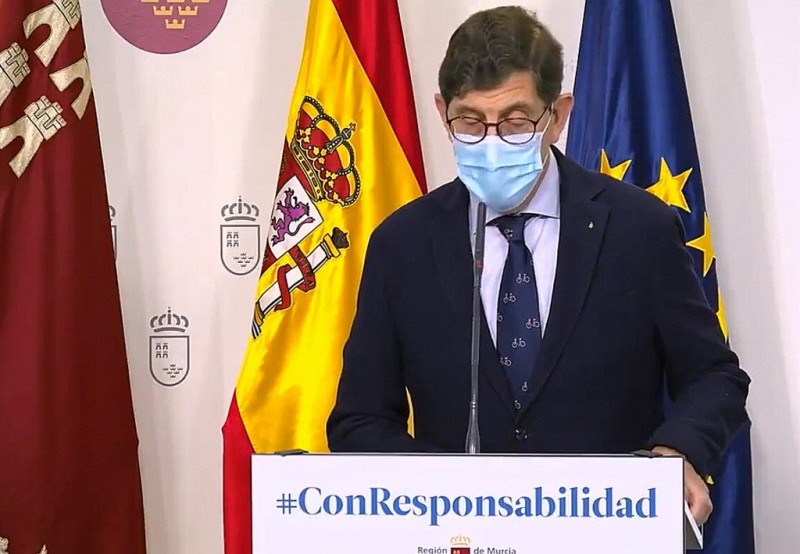
Covid Murcia:
Saturday: 23 new cases, active total 128
Sunday:18 new cases, active total 139
Drinking club in Totana closed as new outbreak appears.
Total in Bolivian outbreak reaches 105 and the Atalaya leisure zone, linked to the Bolivian outbreak total reaches 34. Click for Sunday
Monday: 19 new cases; active total 158
Tuesday:14 new cases; 170 active cases
Wednesday: 31 new cases, active total 196
Thursday: 67 new cases, active total 252
Friday: 53 new cases, active total 305
The figures above say it all. Throughout the week the number of cases in the Murcia region has steadily risen, due principally to the Bolivian outbreak which has now fragmented into other associated outbreaks.
To recap rapidly this is the three Bolvians who live in Murcia and returned on June 3rd, bringing Covid with them.
This week the original cases relating to their activities which caused initial concern such as the frozen veg packing factory in El Raal, are largely under control, but the problem has surged in the nocturnal Las Atalayas leisure zone in Murcia City. These venues are known as locales de ocio nocturno, and are large venues where particularly young people tend to gather to drink and socialise and are open well into the early hours, packed with people. This is the environment in which Covid thrives and it has.
During the week it transpired that our three Bolivians, one of whom was a DJ, had been active in the Atalayas leisure zone and cases started to appear. Once the regional government had linked the surge in new cases to Atalayas they acted swiftly and used the new powers they had approved last Thursday to close down the four venues and passed additional measures to limit the spread of the virus in this type of venue.
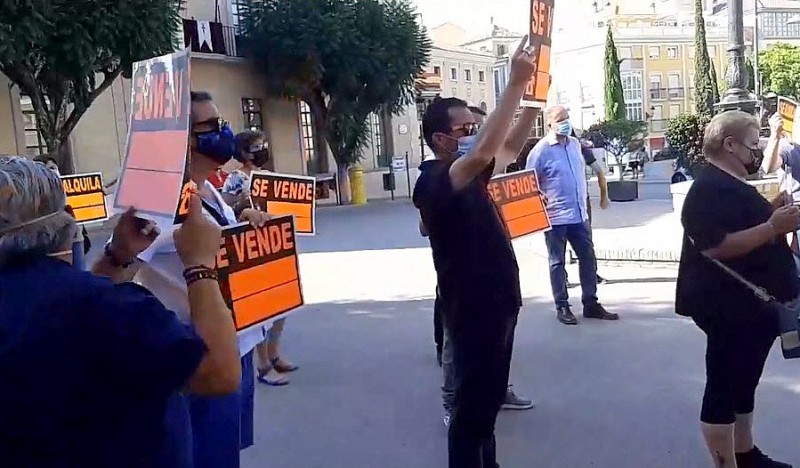
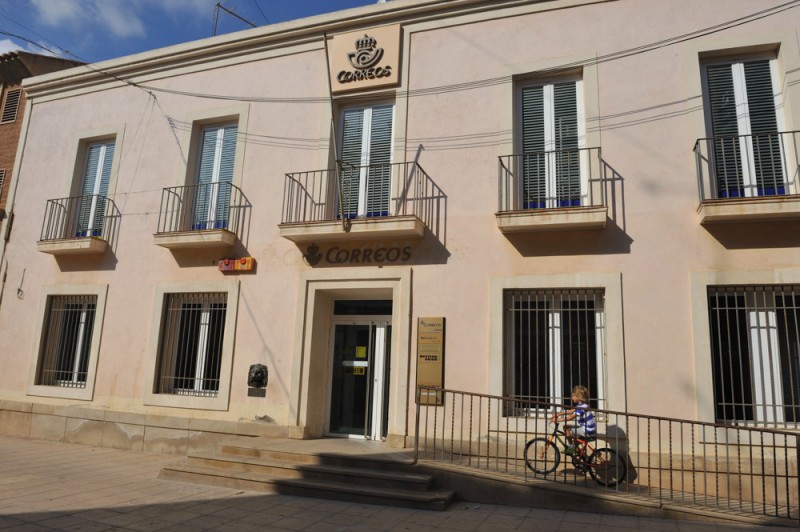
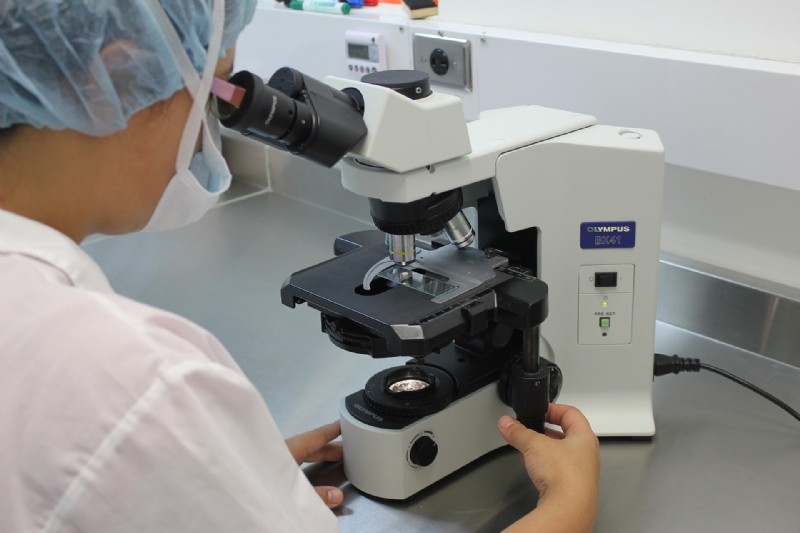
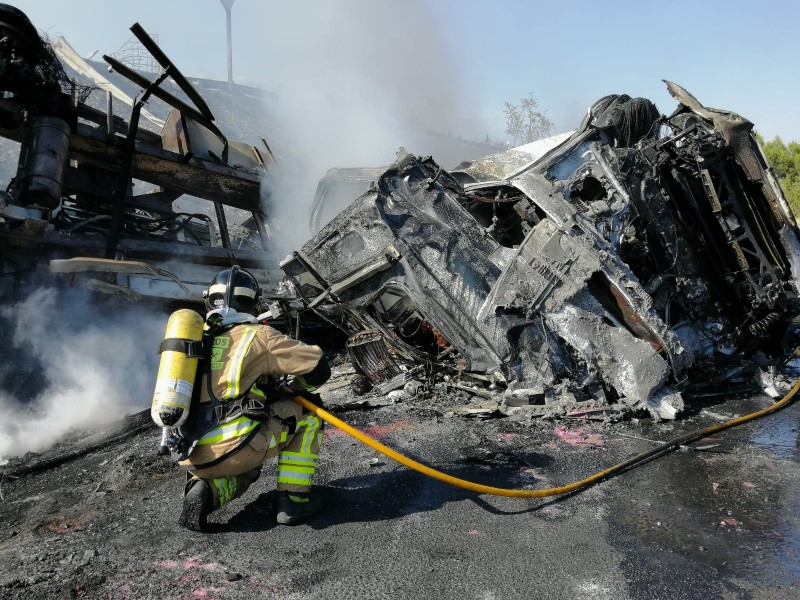
Other news:
Eight year old girl dies in collision between boat and jet-ski in la Manga: For reasons which are not clear, the father of the child fell off the jet-ski into the water, leaving the child on the back and the jet-ski ploughed into a boat. Click to read
Excitement as 100 turtle eggs are laid on the beach in la Manga del Mar Menor.Click for full article
There is considerable excitement amongst those working to conserve the population of loggerhead turtles in the Mediteranean at the news that 100 eggs have been laid on a beach in la Manga del Mar Menor this week.
Recently there have been two failed attempts at egg laying, with the tantalising trails in the sand showing that turtles have come ashore and had a scratch around before deciding to leave the beach; one of these was witnessed by a beach cleaner in the middle of the night, and hopes were high that the females concerned would return and lay.
This turtle came ashore in the early hours of Thursday morning and laid 100 eggs in a hole dug in the sand, which were discovered by volunteers working within the programme currently underway within the region to try and protect this vulnerable species from its worst enemy; ourselves.
The loggerhead turtle (Caretta caretta) is classified as “vulnerable” in the Spanish Catalogue of Threatened Species and as “in danger” by the International Union for Conservation of Nature (IUCN).
Among its main threats are the ingestion of plastics and different types of flotation debris, their accidental capture in fishing nets, the entanglement of drifting fibers or lines and, to a lesser extent, collision with boats or the destruction and alteration of nesting beaches.
Turtles are regularly found off the Murcian coastline and those which can be saved are taken to the regional wildlife recovery centre for nursing and subsequent release. It’s heartbreaking to see the images of turtles completely entangled in fishing nets, with raffia bags wrapped around their necks, their shells shredded by outboard motors or just floating on the surface starving to death with their stomachs full of plastic waste, but that’s the price they pay for our activities; only one in a thousand loggerhead turtles will reach adulthood, hence the protection programme to give them a “headstart in life” by taking them up to one year of age in controlled conditions.
A gradual rise in water temperatures in recent years has caused more turtles to return to Spanish beaches and eggs have been found on the coast of the Comunidad Valenciana, the province of Almería and the Balearic Islands as well as Murcia last year.
Once found the eggs are normally taken into protection for incubation and the young turtles are kept in captivity for around a year before being released.
Whenever possible, eggs are left on the beach on which they are found in order to ensure that when they hatch the hatchlings have some instinct for the beach on which they were born; we still don´t understand how some of the miracles of the natural world work, but it’s common for animals, mammals and birds to have an inherent sense of where “home “ is, and it is hoped that by leaving the eggs on the beach that this may in years to come bring turtles back to this same spot to perpetuate the circle of birth.
The eggs were moved by staff from the regional wildlife recovery centre, the Centro de Recuperación de Fauna Silvestre de El Valle, in collaboration with colleagues from the Universidad de Valencia and Universidad Politécnica de Valencia, who are also involved in the “headstart programme” to a safer location about 500 metres from the site of the original test so that they can be watched by volunteers in the hope that they hatch.
As a precaution, 10 were put in an incubator in the wildlife recovery centre.
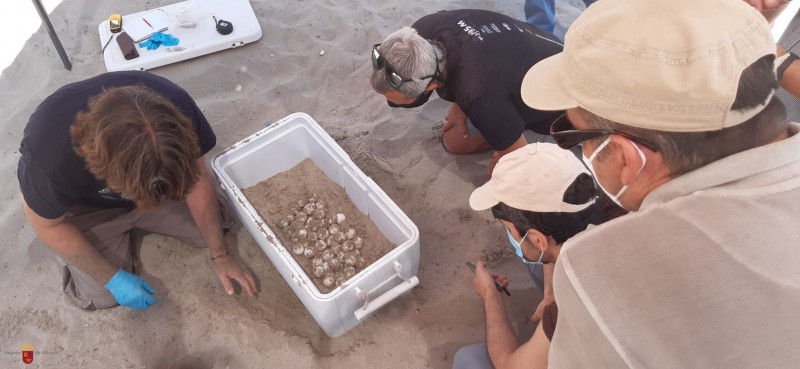
Bather drowns off La Manga del Mar Menor; Click for article.
Another bather also died on Friday in the same area, but there wasn´t time to write up the piece.
Workman dies trapped beneath concrete mixer in Cartagena: Click here
Murcia City demolishes walls of old jail to make cultural centre: Click here
86 Los Alcázares businesses join safe tourism destination campaign; Click here
Haulage driver dies as lorry is incinerated in Puerto Lumbreras: Click here
New electrical interconnection project to improve supply at northern end of la Manga. Click here
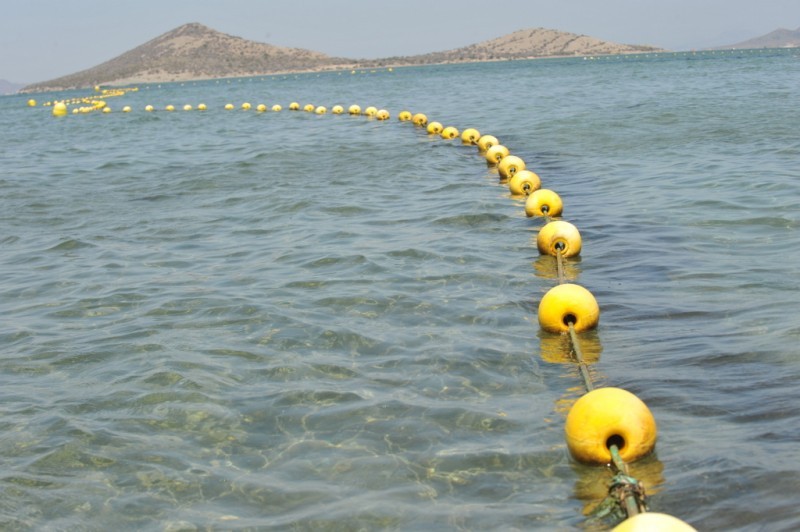
Tourism versus ecology; jellyfish nets go down in the Mar Menor.Scientists say the nets encourage algal growth and stop water movement.Click to read the full article
Finally, this week the Mar Menor Protection Law has been approved by the regional parliament. This is a very important story, but I basically ran out of time this week and haven´t had time to write it up due to the Covid developments and arrival of a wave of migrants on Friday. I am taking a few days off this week and will write it up at some point and post on the site as background material needs to be added to it explaining what the law will do and what's in it which is several hours of prep time before writing. It is important as it starts to address some of the problems relating to the Mar Menor and resolving some of the long-term issues which have caused the problems, but only some of them and there is still much to be done in the future.
The water is holding up well and the algal growth seems to be remaining in the beaches where it has been well documented already, other beaches clear and the water warm.
Hopefully it will continue like this for the remainder of the summer.
It's going to be very hot in the next few days, so take care and have a good week. Don´t forget, no bulletin next week unless there are major developments.
Thank you for your support. Please encourage friends to support the bulletin.
















